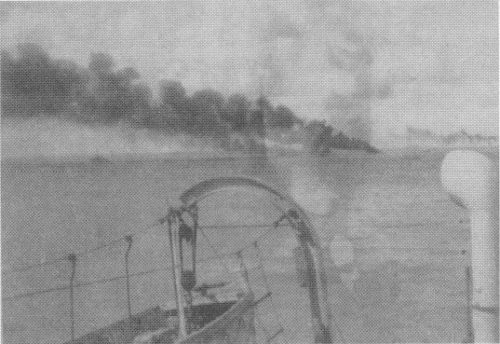- Author
- Minto, Thomas, MN, Captain
- Subjects
- History - WW2, WWII operations, Ship histories and stories
- Tags
-
- RAN Ships
- AHS Manunda, HMAS Swan II, HMAS Platypus
- Publication
- June 2002 edition of the Naval Historical Review (all rights reserved)
The Raid starts
At 1005 hrs on the morning of Thursday 19th February, out of a lovely sky with a few clouds, we got our first taste of enemy action in Australian waters.
No matter what has been written elsewhere, the first warning the shipping received was when the first bomb hit near the wharf. Then the sirens went ashore. The depot ship Platypus was a bad second.
I was kept so busy for some time getting things under my control, in order, that I did not have time to look around until about 1015 hrs, when I arrived back on the bridge. I looked around and saw what had happened in ten minutes.
The wharf was burning near its inner end, Barossa and Neptuna at the wharf both appeared to have been hit and the Neptuna was on fire. Zealandia, about 500 yards away, was on fire. Mauna Loa was down by the stem with her back broken. Tulagi was nowhere in sight. Port Mar was in trouble. The remaining merchant ship seemed to be okay. We were undamaged.

On the naval side, a Catalina flying boat was ablaze on the water. An American destroyer, ablaze aft, went dashing across our bows, missing us by inches, and steering with his engines. Another American destroyer was on our port side, a solid mass of flame with burning oil around him and what was left of the crew jumping into the burning oil. We manned our motor lifeboat with four of a crew and went to their rescue. They eventually picked up over thirty badly burnt and wounded men: other boats later picked up a few more.
I could hear the planes again, and took time off to look up. I saw the Japanese coming over in perfect close V formation, at what seemed to me about 8 to 10 thousand feet, and no more. They ignored the anti-aircraft fire and I saw a perfect example of pattern bombing. I saw the bombs released and followed their flight. They straddled the Neptuna at the wharf.
There was a pause and then a ball of orange flame about 200 feet high or higher, and a shower of debris. The Neptuna was blown up and one half was lying in front of the wharf on its side; the other was about five feet above the water. It drifted down with the tide a little and then sank.
Then it was the Zealandia’s turn again. Once more perfect bombing, and she was on fire from stem to stem, eventually sinking within the hour.
On the other side, the British Motorist was not sinking quickly enough, so the formation gave her another stick and she turned on her side and sank.
Meanwhile we were getting other boats away to pick up survivors when the dive bombers arrived. I did not see them as I had all my attention on the lifeboat, but I heard the roar of his engine and his machine guns blazing. Then there was a terrific roar, and the Manunda rolled from the effects of a near miss, which we later discovered.
This killed four on board and put 76 holes and over a hundred deep scores in our plating overside, and played hell with our gear and upper works. We got our wind back and carried on when we heard the same thing again. There was a terrific roar and debris flying around everywhere. The bomb had missed the bridge and pierced the music room skylight, exploded at `B’ and `C’ Decks, doing terrific damage and causing many casualties. The hit and near miss between them killed nine of the crew and three military personnel, including one nurse, seriously injured seven and caused about forty minor injuries.
The after end of the ship still functioned as a hospital unit. Our own boats and naval launches brought the wounded alongside, so that by nightfall we had seventy six patients on board. Mr Curtin stated 35 were injured in this raid.
Altogether seven fires broke out but we were fortunate enough to get to them quickly before they developed, and extinguished them. There was one exception and one fire had to be fought with smoke helmets for over an hour and was eventually subdued.




